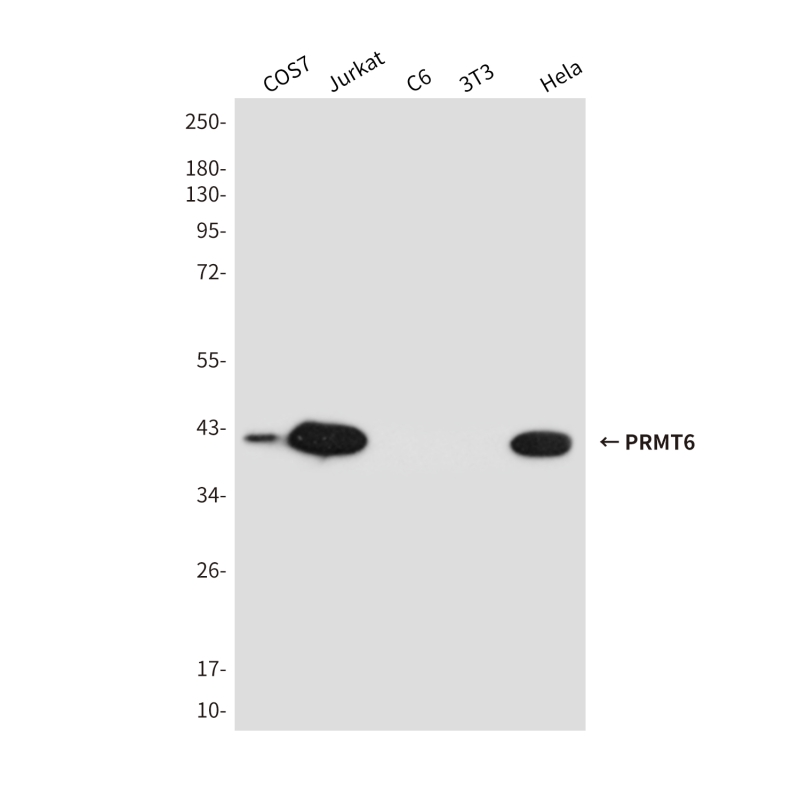
| WB | 咨询技术 | Human,Monkey |
| IF | 咨询技术 | Human,Monkey |
| IHC | 1/50-1/100 | Human,Monkey |
| ICC | 1/50-1/200 | Human,Monkey |
| FCM | 咨询技术 | Human,Monkey |
| Elisa | 咨询技术 | Human,Monkey |
| Aliases | HRMT1L6; PRMT 6 |
| Entrez GeneID | 55170 |
| WB Predicted band size | Calculated MW: 42 kDa; Observed MW: 42 kDa |
| Host/Isotype | Mouse IgG1 |
| Antibody Type | Primary antibody |
| Storage | Store at 4°C short term. Aliquot and store at -20°C long term. Avoid freeze/thaw cycles. |
| Species Reactivity | Human,Monkey |
| Immunogen | Purified recombinant human PRMT6 protein fragments expressed in E.coli. |
| Formulation | Purified antibody in PBS with 0.05% sodium azide,0.5%BSA and 50% glycerol. |
+ +
以下是关于PRMT6抗体的3篇参考文献的简要总结:
1. **文献名称**:*PRMT6-mediated methylation of RXRα regulates transcriptional activation*
**作者**:Di Lorenzo A. et al.
**摘要**:研究揭示了PRMT6通过甲基化核受体RXRα调控其转录活性的机制。文中使用PRMT6抗体进行免疫共沉淀(Co-IP)实验,证实PRMT6与RXRα的直接相互作用及其在基因表达调控中的作用。
2. **文献名称**:*PRMT6 deficiency induces autoimmunity by promoting IL-6 via NF-κB signaling*
**作者**:Kim Y.R. et al.
**摘要**:文章发现PRMT6缺失通过激活NF-κB通路导致IL-6过度表达,从而引发自身免疫反应。研究利用PRMT6抗体进行Western blot和免疫组化,证明PRMT6在免疫细胞中的表达下调与疾病表型相关。
3. **文献名称**:*Asymmetric dimethylarginine methylation by PRMT6 promotes HIV-1 latency*
**作者**:Kessing C.F. et al.
**摘要**:该研究阐明PRMT6通过催化组蛋白H3R2甲基化抑制HIV-1转录,促进病毒潜伏。文中通过染色质免疫沉淀(ChIP)结合PRMT6抗体,证实其在HIV启动子区域的富集及表观遗传调控功能。
这些文献均通过PRMT6抗体探究其在基因调控、免疫反应及病毒潜伏中的分子机制。
PRMT6 (Protein Arginine Methyltransferase 6) is a member of the PRMT family, which catalyzes the transfer of methyl groups to arginine residues on histone and non-histone proteins, primarily generating asymmetric dimethylarginine (ADMA) modifications. It is implicated in epigenetic regulation, transcriptional control, DNA repair, and cellular signaling. PRMT6 is unique for its preference for monomethylation and its role in repressing gene expression by methylating histone H3 at arginine 2 (H3R2me2a), which antagonizes the placement of activating marks like H3K4me3. It also methylates non-histone substrates, including proteins involved in RNA processing and viral replication. Dysregulation of PRMT6 has been linked to cancers, neurodegenerative diseases, and viral pathogenesis (e.g., HIV-1), making it a target for therapeutic research.
PRMT6 antibodies are essential tools for studying its expression, localization, and function. These antibodies are typically raised against specific epitopes, such as the N-terminal or catalytic domains, and validated for applications like Western blotting, immunohistochemistry, immunofluorescence, and chromatin immunoprecipitation. High-quality PRMT6 antibodies demonstrate specificity confirmed by knockout/knockdown controls and cross-reactivity checks against other PRMTs. Researchers use them to explore PRMT6's role in disease mechanisms, its interaction partners, and the effects of its inhibition. Commercial antibodies often cite reactivity across human, mouse, and rat samples, with variability in performance depending on experimental conditions.
×